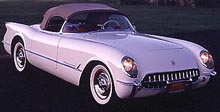


|
|
|
|
Engine Noise Diagnosis (John Myers – Vetteworks)
Rods To Verify use a garden hose or a long screwdriver against your ear. You may be able to detect exactly where the noise is coming from by holding them against the block at different locations. This trick works like magic. (Don’t forget to plug your opposite ear!) The only remedy here is the removal of the oil pan and investigating to see how extensive the damage has become.
Burned Valves Similarities exist with the sounds of a burnt valve when compared to a vacuum leak or bad compression (ie: Broken ring or hole in piston). Make sure you know the difference. To Verify Check the exhaust for a pulse by putting your hand over the exhaust and feeling for an uneven pulse or rhythm. Be especially alert for any feeling of vacuum. This can show up because of the open path past the exhaust valve during the intake stroke. Another method you can use to determine this is by disconnecting the ignition coil and cranking over the engine. As compression is lost in the affected cylinder, a momentary increase in speed of the starter can be heard. If you still can't 'nail it down' try disconnecting the spark plug wires at each cylinder. Do this until you notice that no change of idle quality results. In other words, without that particular cylinder firing, there's no change in engine idle or sound. Lastly, get yourself a compression tester and check each cylinder.
Valvetrain Chatter There are a number of things which can cause these symptoms to occur. Normally, this sounds like a metallic 'ticking' near the top end of the engine which decreases as the engine warms up. In more severe cases it can be quite noticeable and may not go away completely. In many cases this can be the hydraulic lifters. Either they are out of adjustment or haven't had a chance to 'pump up' completely. On the other hand it may be piston 'slap' (which may go away as the engine warms up), a small header or exhaust leak, a collapsed lifter, a flat cam lobe. This sound may also be totally normal for a solid lifter camshaft. If it is a collapsed lifter or deteriorated camshaft lobe, performance would also suffer. To Verify use a garden hose or a long screwdriver against your ear. You may be able to detect exactly where the noise is coming from by holding them against the block and heads in different locations. To fix this it will probably require a rocker arm adjustment. Verify that all rockers are 'rocking' equally. Any variation in rocker arm movement may be evidence of a defective camshaft. Verify lift height after adjustment. Also verify the free and unobstructed travel of all the components to include rocker arms, lifters, pushrods etc.
Exhaust leaks Exhaust leaks can show up as a ticking sound, a noticeable 'ppffft ppffft' sound or a louder 'vrap, vrap, vrap' sound. Sometimes an exhaust leak can be evidenced by backfiring. In this case cool outside air is being sucked into the hot exhaust and mixed with residual fuel. If hot enough it will ignite, causing a backfire. To Verify You can use a screwdriver but the best method is to carefully feel for the leak around the exhaust manifold or header tube seams. Also, you may be able to look for signs of black soot or trails of exhaust emanating from the leak. To fix this you can opt for a new header gasket or copper RTV. You may get away with a re-torque on the header bolts. In some cases, a warped header flange may cause continual problems. Some mechanics double up the header gaskets to remedy this. The contents of this site are copyright © 2000, Vetteworks, All rights reserved |